2022年英语中考语法复习课件-情态动词课件(28张ppt)
文档属性
| 名称 | 2022年英语中考语法复习课件-情态动词课件(28张ppt) |
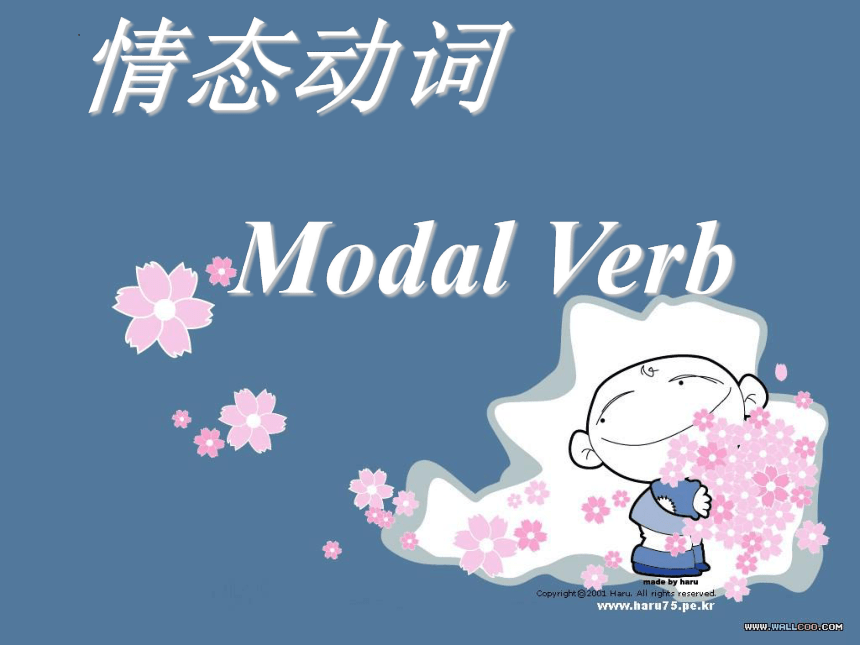
|
|
| 格式 | ppt | ||
| 文件大小 | 1.4MB | ||
| 资源类型 | 教案 | ||
| 版本资源 | 通用版 | ||
| 科目 | 英语 | ||
| 更新时间 | 2022-04-11 21:27:09 | ||
图片预览

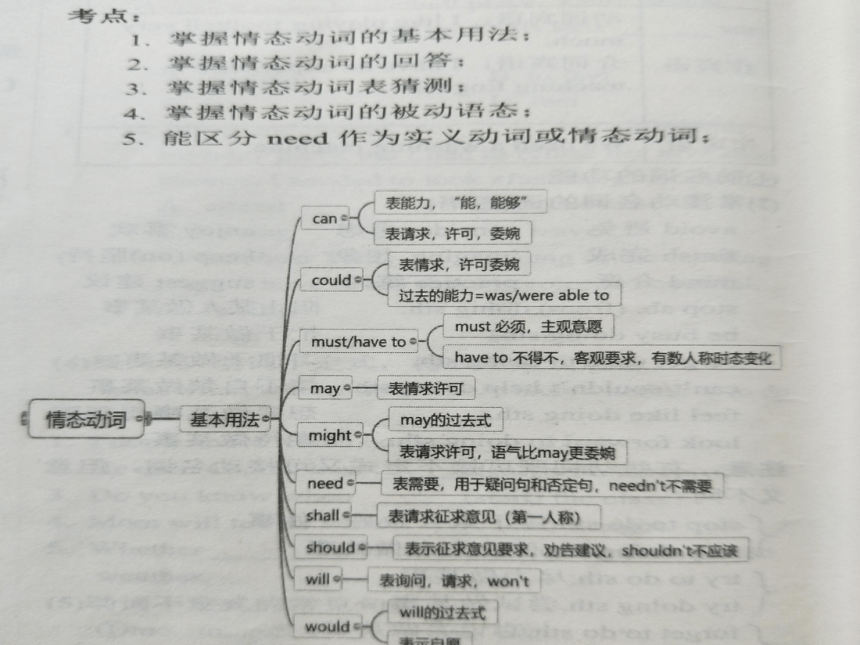
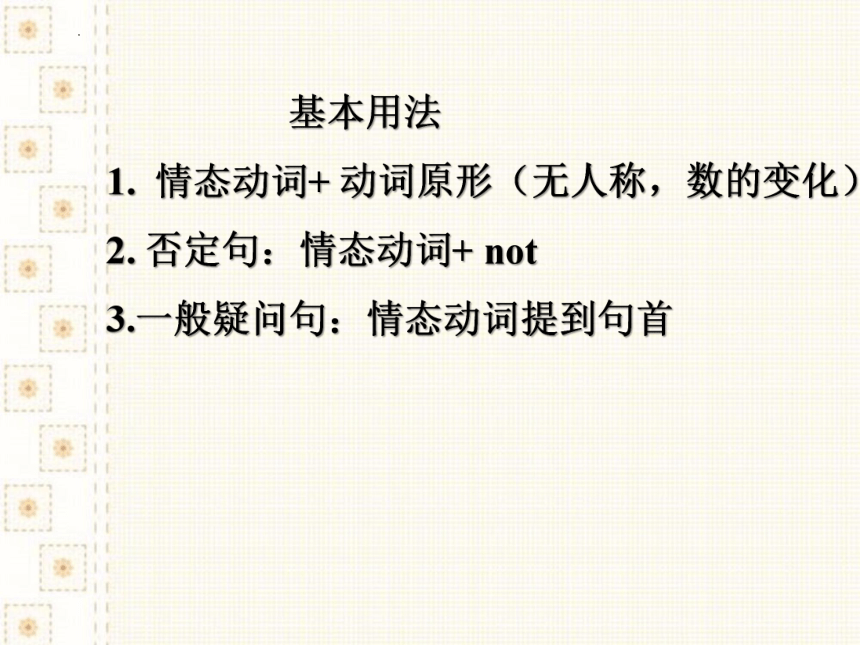
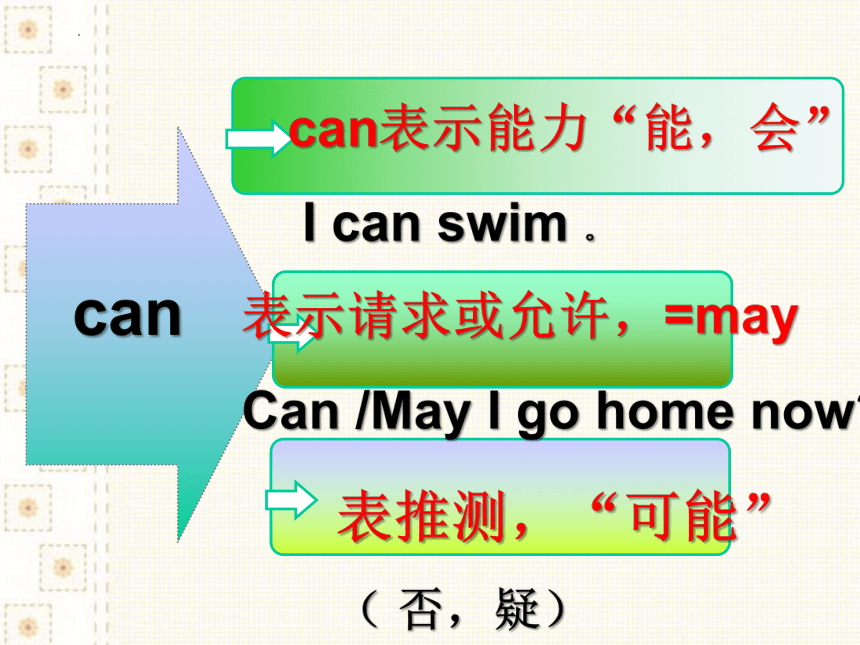
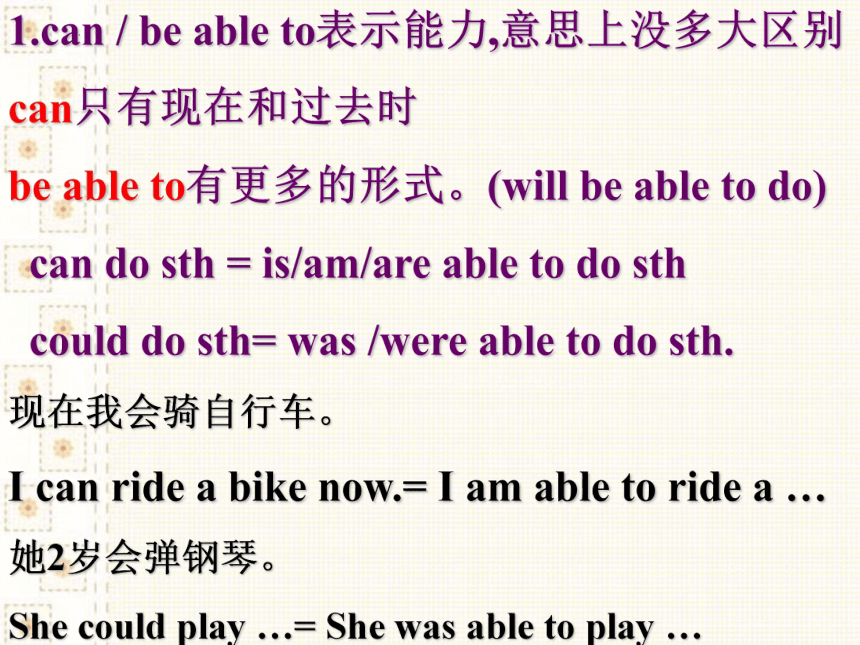
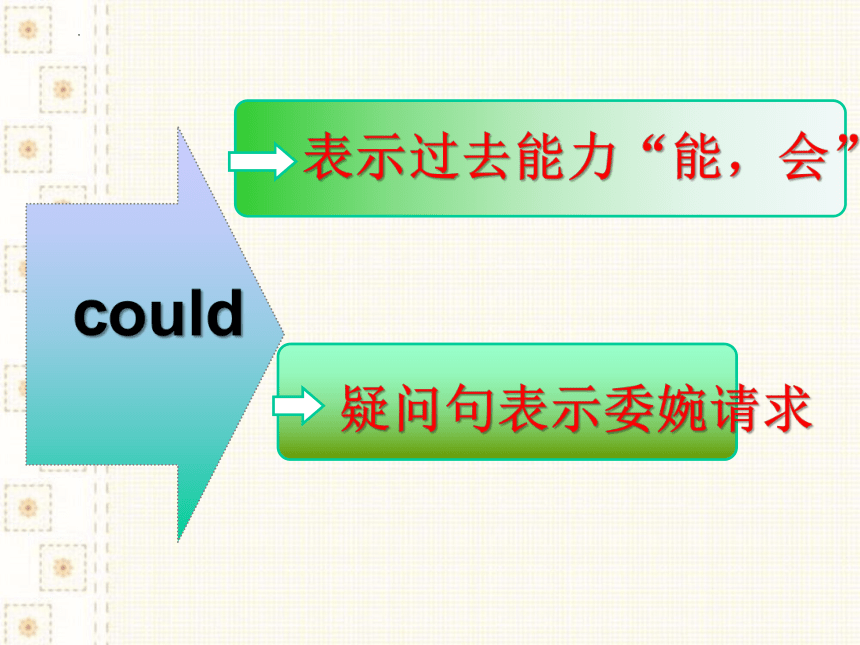
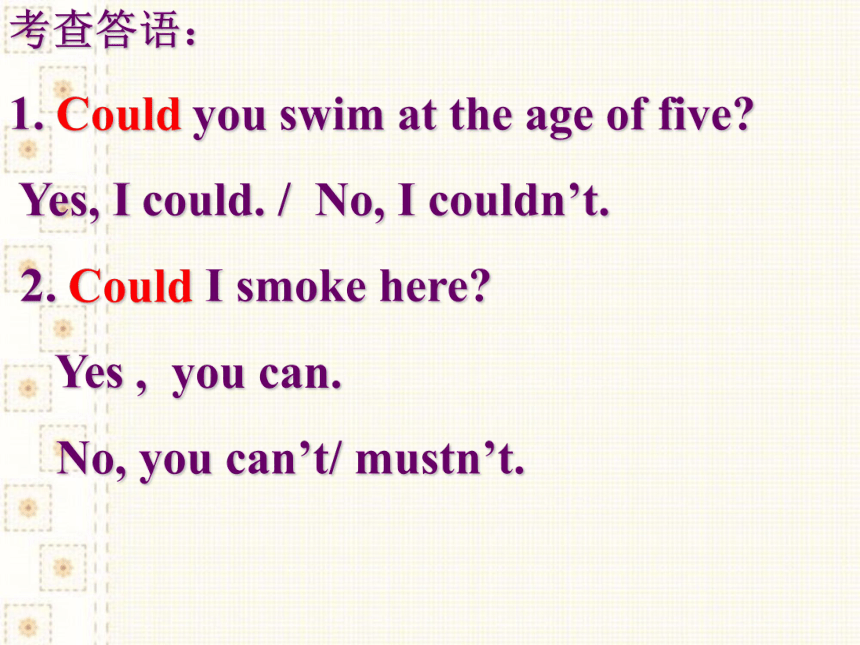
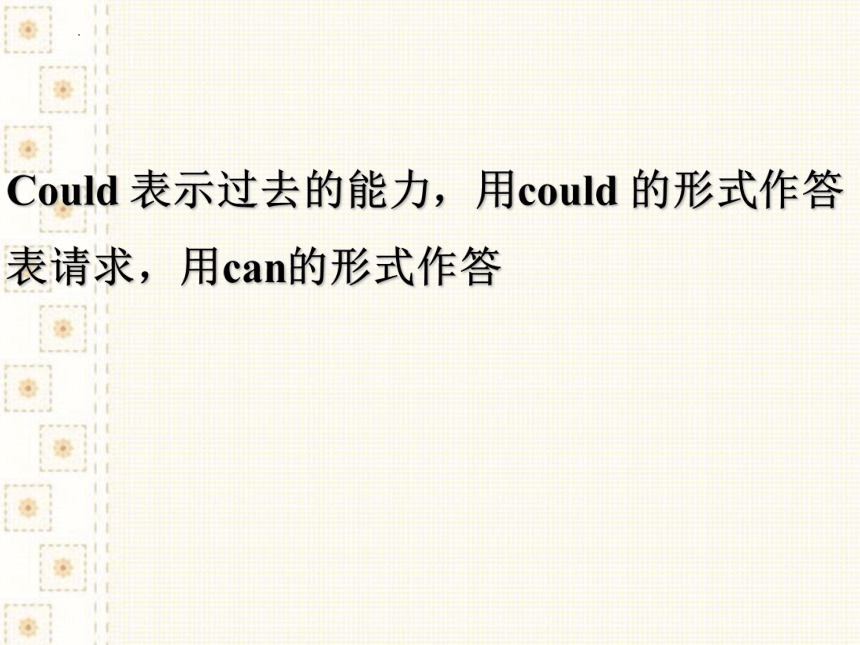
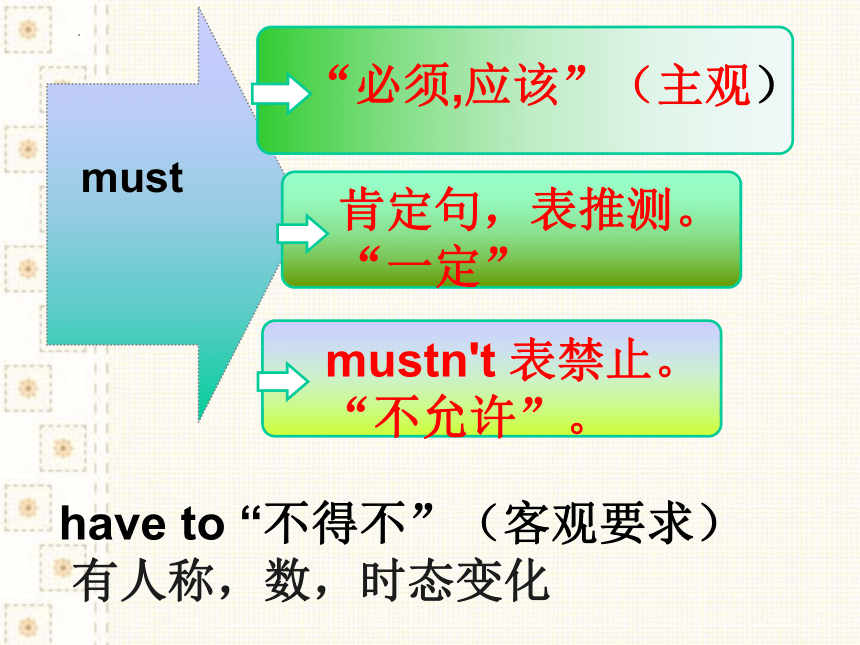
文档简介
(共28张PPT)
情态动词
Modal Verb
基本用法
情态动词+ 动词原形(无人称,数的变化)
2. 否定句:情态动词+ not
3.一般疑问句:情态动词提到句首
can
can表示能力“能,会”
I can swim 。
表示请求或允许,=may
Can /May I go home now
表推测,“可能”
( 否,疑)
1.can / be able to表示能力,意思上没多大区别
can只有现在和过去时
be able to有更多的形式。(will be able to do)
can do sth = is/am/are able to do sth
could do sth= was /were able to do sth.
现在我会骑自行车。
I can ride a bike now.= I am able to ride a …
她2岁会弹钢琴。
She could play …= She was able to play …
could
表示过去能力“能,会”
疑问句表示委婉请求
考查答语:
1. Could you swim at the age of five
Yes, I could. / No, I couldn’t.
2. Could I smoke here
Yes , you can.
No, you can’t/ mustn’t.
Could 表示过去的能力,用could 的形式作答
表请求,用can的形式作答
must
肯定句,表推测。
“一定”
“必须,应该”(主观)
mustn't 表禁止。
“不允许”。
have to “不得不”(客观要求)
有人称,数,时态变化
1. You must do everything as I do.
2. The light is still on, so he must be at home.
The light is off, so he can’t be at home.
3. Don’t smoke in the office
= You mustn’t smoke in the office.
4.To make more money,they_____(must/have to) go to the city to look for jobs.
Must I return the book by Friday
Yes , you ______.
No, you ____________ .
must
needn’t / don’t have to
may/might 1).二者都可以表请求,许可,但might语气更委婉 May/ Might I smoke here
2)都可表示推测“可能,也许”但may比might可能性大。
3) maybe/ may be
_________ he is proud of his grades.
He _______ proud of his grades.
Maybe
may be
The old man may live alone.
_______ the old man ______ alone.
Maybe
lives
—May / Might I use your bike
—Yes, you can / may.
----No, you can’t /mustn’t
1. — Could I borrow your dictionary
— Yes, of course you _______.
A. might B. will C. can D. should
2. — May I watch TV after supper
— Yes, you ________.
A. may B. must C. might D. can
C
A /D
need
需要
实意动词 (常用于肯定句)
(句型见书P 105)
情态动词 (常用于否,疑问句)
名词 (句型见P105)
Nobody need to be afraid of catching
the disease.
You need go to bed early.
These dishes need to be cleaned carefully.
These dishes need cleaning carefully.
She needn’t take a taxi.
She doesn’t need to take a taxi.
--Need I finish the work today
--Yes, ________________.
No, ________________.
--Must I finish the work today
--Yes, ________________.
No, ________________.
you must
you needn’t
/you don’t have to
you must
you needn’t
/you don’t have to
_____ you ______ (need) any help
The tree doesn’t need ______ (water).
You needn’t _____ (finish) that work today.
He ______ (need) some money.
She doesn’t need ______ (ask) us.
______ he ______ (need) to do it
shall
表示请求或征求意见,用于人称I , we
Shall we go shopping
用于反意疑问句
Let’s watch a film, shall we
should
“应该”,表示劝告,建议,
否定:shouldn’t
should do sth
= be supposed/expected to do sth.
will
回答祈使句
will用于疑问句中时,可以表示征求意见或提建议
Will you clean your room
否定式:won’t
will 的过去式为would
用于反意疑问句
1. Remember to eat your breakfast.
OK , I will.
2. Don’t be absent from class again.
Sorry, I won’t.
作答专练:给出肯定,否定回答
1.May I use your phone
2.May I take the book out of the library
3.Could I look at your new watch
4. Could you pass me something to eat
5.Could you skate last year
6. Must we wash hair three times a week
7.Need I clean my room every day
1._____ I play computer games for an hour
2. _____ we do homework carefully
Yes, we must.
3.______ you pass me something to eat
4. _____ you play soccer
5. _____ you swim when you were 3
Can/ Could/ May
Need /Must
Can/ Could/ Will
Can
Could
The CD player must be his. (变否定句)
The CD player can’t be his.
1. 对正在发生的事情推测:
情态动词+ be doing
2. 情态动词用于There be推测
Eg. There must/ could be something visting the homes in our neighborhood.
考查(三):情态动词的被动语态
情态动词+ be done
P106 答案:
be allowed
2. be made
3. be parked
be planted
watering/ to be watered
Good-bye!
情态动词
Modal Verb
基本用法
情态动词+ 动词原形(无人称,数的变化)
2. 否定句:情态动词+ not
3.一般疑问句:情态动词提到句首
can
can表示能力“能,会”
I can swim 。
表示请求或允许,=may
Can /May I go home now
表推测,“可能”
( 否,疑)
1.can / be able to表示能力,意思上没多大区别
can只有现在和过去时
be able to有更多的形式。(will be able to do)
can do sth = is/am/are able to do sth
could do sth= was /were able to do sth.
现在我会骑自行车。
I can ride a bike now.= I am able to ride a …
她2岁会弹钢琴。
She could play …= She was able to play …
could
表示过去能力“能,会”
疑问句表示委婉请求
考查答语:
1. Could you swim at the age of five
Yes, I could. / No, I couldn’t.
2. Could I smoke here
Yes , you can.
No, you can’t/ mustn’t.
Could 表示过去的能力,用could 的形式作答
表请求,用can的形式作答
must
肯定句,表推测。
“一定”
“必须,应该”(主观)
mustn't 表禁止。
“不允许”。
have to “不得不”(客观要求)
有人称,数,时态变化
1. You must do everything as I do.
2. The light is still on, so he must be at home.
The light is off, so he can’t be at home.
3. Don’t smoke in the office
= You mustn’t smoke in the office.
4.To make more money,they_____(must/have to) go to the city to look for jobs.
Must I return the book by Friday
Yes , you ______.
No, you ____________ .
must
needn’t / don’t have to
may/might 1).二者都可以表请求,许可,但might语气更委婉 May/ Might I smoke here
2)都可表示推测“可能,也许”但may比might可能性大。
3) maybe/ may be
_________ he is proud of his grades.
He _______ proud of his grades.
Maybe
may be
The old man may live alone.
_______ the old man ______ alone.
Maybe
lives
—May / Might I use your bike
—Yes, you can / may.
----No, you can’t /mustn’t
1. — Could I borrow your dictionary
— Yes, of course you _______.
A. might B. will C. can D. should
2. — May I watch TV after supper
— Yes, you ________.
A. may B. must C. might D. can
C
A /D
need
需要
实意动词 (常用于肯定句)
(句型见书P 105)
情态动词 (常用于否,疑问句)
名词 (句型见P105)
Nobody need to be afraid of catching
the disease.
You need go to bed early.
These dishes need to be cleaned carefully.
These dishes need cleaning carefully.
She needn’t take a taxi.
She doesn’t need to take a taxi.
--Need I finish the work today
--Yes, ________________.
No, ________________.
--Must I finish the work today
--Yes, ________________.
No, ________________.
you must
you needn’t
/you don’t have to
you must
you needn’t
/you don’t have to
_____ you ______ (need) any help
The tree doesn’t need ______ (water).
You needn’t _____ (finish) that work today.
He ______ (need) some money.
She doesn’t need ______ (ask) us.
______ he ______ (need) to do it
shall
表示请求或征求意见,用于人称I , we
Shall we go shopping
用于反意疑问句
Let’s watch a film, shall we
should
“应该”,表示劝告,建议,
否定:shouldn’t
should do sth
= be supposed/expected to do sth.
will
回答祈使句
will用于疑问句中时,可以表示征求意见或提建议
Will you clean your room
否定式:won’t
will 的过去式为would
用于反意疑问句
1. Remember to eat your breakfast.
OK , I will.
2. Don’t be absent from class again.
Sorry, I won’t.
作答专练:给出肯定,否定回答
1.May I use your phone
2.May I take the book out of the library
3.Could I look at your new watch
4. Could you pass me something to eat
5.Could you skate last year
6. Must we wash hair three times a week
7.Need I clean my room every day
1._____ I play computer games for an hour
2. _____ we do homework carefully
Yes, we must.
3.______ you pass me something to eat
4. _____ you play soccer
5. _____ you swim when you were 3
Can/ Could/ May
Need /Must
Can/ Could/ Will
Can
Could
The CD player must be his. (变否定句)
The CD player can’t be his.
1. 对正在发生的事情推测:
情态动词+ be doing
2. 情态动词用于There be推测
Eg. There must/ could be something visting the homes in our neighborhood.
考查(三):情态动词的被动语态
情态动词+ be done
P106 答案:
be allowed
2. be made
3. be parked
be planted
watering/ to be watered
Good-bye!
同课章节目录
- 词法
- 名词
- 动词和动词短语
- 动词语态
- 动词时态
- 助动词和情态动词
- 非谓语动词
- 冠词
- 代词
- 数词和量词
- 形容词副词及其比较等级
- 介词和介词短语
- 连词和感叹词
- 构词法
- 相似、相近词比较
- 句法
- 陈述句
- 一般疑问句和否定疑问句
- 特殊疑问句及选择疑问句
- 反意疑问句
- 存在句(There be句型)
- 宾语从句
- 定语从句
- 状语从句
- 主谓一致问题
- 简单句
- 并列句
- 复合句
- 主谓一致
- 主、表语从句
- 名词性从句
- 直接引语和间接引语
- 虚拟语气
- 感叹句
- 强调句
- 倒装句
- 祈使句
- 句子的成分
- 句子的分类
- 题型专区
- 单项选择部分
- 易错题
- 完形填空
- 阅读理解
- 词汇练习
- 听说训练
- 句型转换
- 补全对话
- 短文改错
- 翻译
- 书面表达
- 任务型阅读
- 语法填空
- 其他资料
